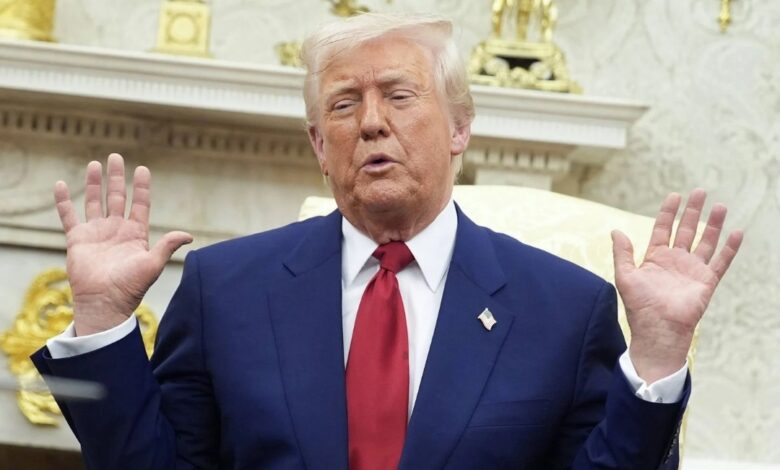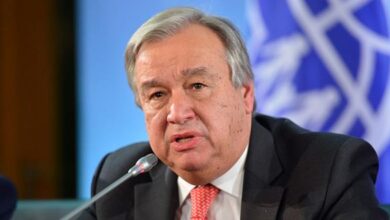The Trade War Initiated by Donald Trump: What Impact on the Global Economy and on Morocco?

Jawad KERDOUDI – President of IMRI
On April 2, 2025, U.S. President Donald Trump announced new tariffs. Starting April 5, 2025, all imported products in the United States will be subject to a 10% tariff. Previously, Donald Trump had established tariffs of 25% on steel, aluminum, and automobiles. The new tariffs will take effect on April 9, 2025, and will apply to all countries. Trump labeled April 2, 2025, as “Liberation Day,” asserting that the United States has been cheated by foreign countries and companies for many years. According to the American president, the purpose of this significant tariff increase is to reduce the U.S. trade deficit, which reached $1,203 billion in 2024. Furthermore, the aim is to relocate U.S. and foreign companies that export to the United States, in a bid to revitalize domestic industry and create jobs. Finally, these tariff increases are intended to boost U.S. government revenue, reduce the budget deficit, and lower taxes. These unilateral increases in tariffs are contrary to international law and the rules of the World Trade Organization (WTO), as well as the free trade agreements signed by the U.S. with many countries. They also violate the principle of non-discrimination as they vary from one country to another.
The formula used by Donald Trump, based on reciprocity, is unprecedented. It involves dividing the bilateral trade deficit of the United States with a specific country by the value of imports from that country, then dividing the result by two. This approach has been criticized by economists who deem it overly simplistic and detrimental to international trade relations. They argue that this method overlooks the complexity of global supply chains and risks triggering retaliatory measures from the United States’ trading partners. The formula results in staggering tariffs not seen since the 1930s, such as 54% for China, 49% for Cambodia, 46% for Vietnam, and 44% for Sri Lanka. Even U.S. allies are not spared: tariffs set at 32% for Taiwan, 31% for Switzerland, 25% for South Korea, 50% for Saint Pierre and Miquelon, 24% for Japan, and 20% for European Union countries. Regarding African nations, Trump has revoked the African Growth and Opportunity Act (AGOA) enacted by the U.S. Congress in 2000 under President Bill Clinton. This agreement had granted duty-free access to the U.S. market for thousands of products made in Sub-Saharan Africa. While most African countries will face a mere 10% tariff, others will endure prohibitive rates such as 47% for Madagascar, 32% for Angola, 31% for Libya, 30% for Algeria and South Africa, and 28% for Tunisia. Additionally, some Arab countries will experience high tariffs: 41% for Syria, 39% for Iraq, and 20% for Jordan.
Morocco, however, has been relatively spared, facing a tariff set at 10%, despite having signed a free trade agreement in 2006 that ensured duty-free status. This is explained by the fact that the 20% VAT is treated as a customs duty and halved, resulting in a tariff rate of 10%. Morocco’s exports to the U.S. account for only 3% of total exports, valued at 12.65 billion dirhams, comprising mainly phosphate fertilizers, fish and seafood, fruits and vegetables, electronic components, semiconductors, electrical machinery and appliances, automotive and aerospace parts, and handicrafts. Meanwhile, Morocco’s imports from the U.S. represent 8.4% of total imports, amounting to 60.31 billion dirhams, and include crude oil, medical and pharmaceutical products, engines, aircraft and related equipment, and natural gas. Nevertheless, similar to other countries, Moroccan automobile exports to the U.S. will incur a 25% tariff.
Consequently, the new 10% tariff on Moroccan exports to the U.S. is expected to have a minimal impact. In fact, this development could open up opportunities for Morocco, given that our exported products will only be taxed at 10%, while, for instance, competing products from the European Union will face a 20% tariff. This new situation may also attract investments to Morocco from China and the European Union, aiming to benefit from the 10% tariff when exporting to the U.S.
Trump’s decision immediately had a negative impact on global stock markets: Argentina’s stock market fell by 7%, Milan’s by 6.53%, Wall Street by 6%, Frankfurt and London by 4.95%, Mexico by 4.8%, and the CAC 40 by 4.6%. It is also noteworthy that the price of oil dropped below $60 per barrel, marking the largest decline since 2021. Other consequences of this decision include rising prices in the U.S., leading to increased inflation, a reduction in international trade and global growth, and the potential for a recession. Indeed, the president of the Federal Reserve (the U.S. Central Bank), Jerome Powell, stated on April 4, 2025, that the increase in tariffs could result in slower growth, higher inflation, and increased unemployment, and he refused to lower interest rates as requested by Donald Trump. It’s important to note that the U.S. national debt in 2024 stood at $35.294 trillion against a GDP of $29.167 trillion, resulting in a debt-to-GDP ratio of 121%.
The response from the countries affected by Trump’s decision to raise tariffs was overwhelmingly negative worldwide. China promptly imposed a 34% tariff on imports from the United States. European Commission President Ursula Von der Leyen stated that the White House’s decision represents a “blow to the global economy,” suggesting that the repercussions will be “disastrous for millions of people, especially the most vulnerable.” She announced that the European Union is already working on “a new package of countermeasures.” Additionally, she called for the United States to shift from confrontation to negotiation. Japan’s trade minister labeled the new U.S. tariffs as “extremely regrettable,” while the Japanese Prime Minister called for an exemption from tariffs, given that Japan is the largest foreign investor in the United States.
In conclusion, one can only regret the unilateral measures taken by the American president without any consultation and in violation of international law and international organizations. These actions could trigger a global economic crisis with severe repercussions, particularly for emerging and developing countries. Protests have already erupted in several American cities criticizing Trump’s authoritarian regime, depicting the U.S. as isolated due to the cessation of USAID and the dismissal of thousands of federal employees. Hopefully, he will return to consultation and negotiation with the U.S.’s key partners. So far, 50 countries have requested to negotiate with him regarding the level of tariff increases.





